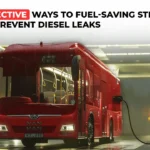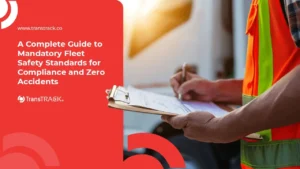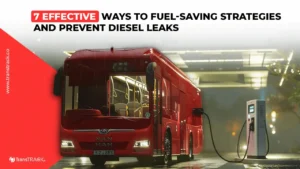The Importance of Car Safety Belts for Safety when Driving
Posted on December 13, 2023 by Nur Wachda Mihmidati

Speaking of driving safety, one of the things that is often ignored by drivers is the use of safety belt. In fact, seat belts are car components that have a very vital role in maintaining the safety of the driver and passengers.
This article TransTRACK will provide an overview of car seat belts, their main functions, the various types of seat belts available, and tips for safe use. So, check out the full explanation below, so that your driving experience is even safer!
Overview of Car Safety Belts
A car safety belt, or often referred to as a seat belt, is not just another vehicle accessory. It is a key protection component designed to provide maximum safety while driving. Seat belts are not just a compliance with traffic regulations, they are designed to protect drivers and passengers from serious injury in an accident.
By reducing the risk of serious injury to the body, particularly to the chest and head, seat belts become lifesavers in critical moments on the road. High-quality materials and ergonomic design make seat belts not only safe but also comfortable to use.
Safety Belt Function
The function of seat belts goes beyond protecting vehicle occupants from serious injury due to collisions or sudden braking. Let’s dig deeper into what the following functions of car seat belts are:
Preventing Serious Injury to the Body
The main function of seat belts is to prevent serious injury to the body of the driver and passengers in the event of a traffic accident. When a vehicle experiences a collision or sudden braking, the human body has a tendency to be thrown forward. Safety belts effectively counteract this tendency by restraining the bodies of drivers and passengers, preventing them from moving freely within the vehicle.
In this way, seat belts help reduce the risk of injury to the head, chest and face, which are often vulnerable areas when accidents occur. In many cases, the use of a seat belt can make the difference between minor injuries and serious, even life-threatening injuries.
Maintains Seating Position Stability
Safety belts not only stop the body from moving forward, but also ensure the stability of the driver and passenger’s seating position. By holding the body firmly in place, the seat belt helps prevent uncontrolled shifting in the vehicle.
Shifting seating positions can cause additional injuries or even result in the driver losing control of the vehicle. Therefore, seat belts are not only physical protection, but also an important element in maintaining stability and control during emergencies.
Increases the Effectiveness of the Airbag System
Safety belts work synergistically with the airbag system in the vehicle. During a collision, the seat belt holds the body in place, ensuring proper positioning for the airbag system to work effectively. This improves overall protection efficiency and reduces the risk of injury from improper deployment of car airbags.
Prevents Ejected from Vehicle
Safety belts also play a critical role in preventing drivers or passengers from being ejected from the vehicle during an accident. Being thrown out of the vehicle can result in fatal injuries, especially if it happens at high speeds.
By keeping the body bound to the seat, seat belts minimize the risk of being thrown out of the vehicle. This not only impacts the safety of the individual using the seat belt, but also prevents potential danger to those around them.
Types of Safety Belts
There are several types of seat belts that are commonly used in vehicles. Here are some types of car seat belts that are often found:
Shoulder Safety Belt
This type of seat belt crosses the shoulders of the driver and passenger, and is then attached to the hips. This provides extra support to the upper body, reducing the risk of injury to the chest and face in an accident.
Waist Safety Belt
This safety belt only crosses the lower part of the body, the waist. Although quite common, the use of waist-only seat belts is not recommended, as it can increase the risk of injury to the upper body in the event of a collision.
Three-Point Safety Belt
This type is a combination of shoulder and waist seat belts. It crosses the shoulders and waist of the driver or passenger, providing better and more even protection to the entire body.
Tips for Wearing a Safe Safety Belt
The importance of safety belts can only be maximized if they are used properly. Here are some tips to ensure safe seat belt use:
Install Correctly
It is important to install the seat belt correctly for it to work properly. Make sure that the shoulder and waist sections of the seat belt cross your body properly.
Fasten Tightly
A loose safety belt can reduce its effectiveness during an accident. Make sure to tighten the seat belt tightly, so that it can provide maximum support and protection.
Make sure to use an age-appropriate safety belt
For children, use a safety seat or booster seat according to age and weight. This will provide optimal protection for children.
Check the Condition of the Safety Belt Periodically
Conduct regular checks on the condition of the seat belt. Make sure there is no damage to the strap or buckle, and ensure that the locking clip is working properly.
Aside from the conventional safety provided by seat belts, there are advanced technologies that can provide an additional layer of safety, namely the Advanced Driver Assistance System (ADAS). This technology not only enhances the driving experience, but also significantly reduces the risk of accidents.
Advance Driver Assistance System is a system that uses sensors and cameras to provide assistance to the driver in various situations. Functions such as automatic braking, collision warning, and lane guidance are some of the features that can help prevent accidents and protect drivers and passengers.
To better understand how ADAS can provide additional safety, you can contact TransTRACK.
That’s all for now, have a safe and enjoyable trip!
Topic :
Recommended Articles

 Bahasa Indonesia
Bahasa Indonesia








